I recently reread a classic Canadian thriller and the second thing that struck me about it1 was the fact that the protagonist’s coping mechanism for escaping disaster—complete isolation—failed so abjectly.
This is far from the only piece of fiction to explore isolation. Consider these five works from the previous millennium.
I Am Legend by Richard Matheson (1954)
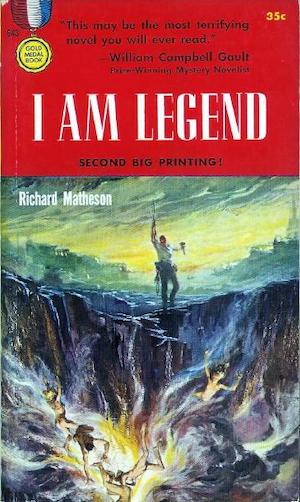
Robert Neville may have been the sole human immune to the pandemic that swept the world. At least, as I Am Legend begins, he has never met another human able, as Robert was, to shrug off the disease that burned through the rest of the population. Forced solitude would be bad enough, but Robert would prefer it to his current reality: The victims of the pandemic die only to rise again, as bloodthirsty creatures of the night. If Robert is to survive, he must become a skilled vampire-hunter.
No matter how closely the infected may resemble those creatures of legend, vampires, Robert is convinced vampires are a purely scientific phenomenon. He has spent much time studying them, hoping to discover vampirism’s cause…and perhaps a cure. However, as so often happens in science, he discovers that his initial understanding of the matter was deeply flawed—a revelation that makes Robert’s situation quite untenable.
The Last Canadian by William C. Heine (1974)
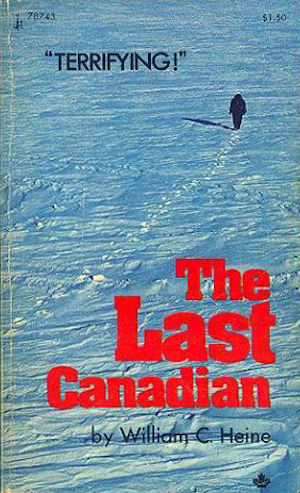
Scarcely had the ink dried on American-born Gene Arnprior’s Canadian2 naturalization papers when a novel, extremely contagious, extremely lethal contagion swept North and South America. Initial news reports were sufficient warning for Gene to flee with wife and children to a remote fishing camp. Alas, the camp is insufficiently remote and Gene discovers that while he is immune, his late wife and children weren’t.
The grieving widower abandons the camp and adopts a nomadic life in the ruins of former Canada and the United States. By chance, he crosses paths with Russian scouts eager to put American resources to Soviet use. Eager to silence Gene, the Russians try and fail to murder the last Canadian before succumbing to the disease themselves. This will not be the first time the Russians try to murder Gene. The lesson the Soviets are all too slow to learn is two-fold:
- Gene’s patience is limited. Attacked one time too many, he sets out to cross the Bering Straits to do to the Russians what they have tried and failed to do to him. True, a lot of innocent people will die if he succeeds but grief-maddened Gene does not care.
- Gene is surprisingly hard to kill. If even repeated nuclear attacks failed to do the job, what can possibly stop Gene in time?
The Only Neat Thing to Do by James Tiptree, Jr. (1985)
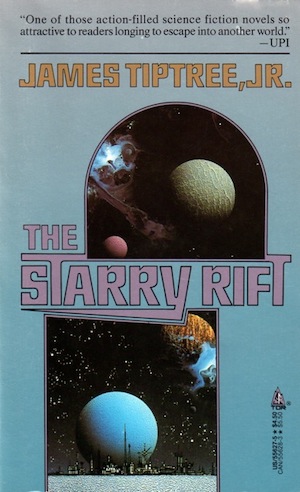
Solitude is a price that sixteen-year-old Coatillia “Coati” Canada Cass is more than willing to pay in exchange for a life spent exploring the unknown in the Great North Rift. If a few white lies are required as well, Coati will mouth those as well. Coati is determined to be one of history’s great explorers…which she will be, but not as she imagined.
A clue puts her on the path of missing Supply Ship DRS nine fourteen BK, whose last fragmentary messages hint at a First Contact situation. Coati sets out to find the ship, only to discover for herself why it was that nine fourteen BK never returned to base.
“The Lady of Shalott” by Loreena McKennitt (1991)
Based on Alfred Lord Tennyson’s poem of the same title, this song3 focuses on the cursed Lady of Shalott. Although the Lady isn’t quite sure what kind of curse has been laid on her, she takes care to prevent it from coming into play. She lives a solitary life on an isolated island some distance from Arthurian Camelot. While the peasants speculate about who she is and why she isolates herself, the Lady of Shalott busily spins and weaves, limiting her perception of the world beyond her windows to indirect glimpses in a mirror. One has to wonder what could possibly go wrong, given the Lady’s prudent measures.
The answer, as anyone familiar with Arthurian tales might guess, is that scoundrel Lancelot, a bold knight who almost never fails to leave the ladies he encounters worse off than before they met him. A glimpse of Lancelot, “Burn’d like one burning flame together” is enough that the Lady forgets herself and takes a direct look, which triggers her fatal curse.
Does lethal hottie Lancelot feel guilty for his part in her doom? He does not! He does, however, take the time to assess his victim’s attractiveness.
But Lancelot mused a little space
He said, “She has a lovely face;
God in his mercy lend her grace,
The Lady of Shalott.”
Lancelot is just the worst.
Remnant Population by Elizabeth Moon (1996)
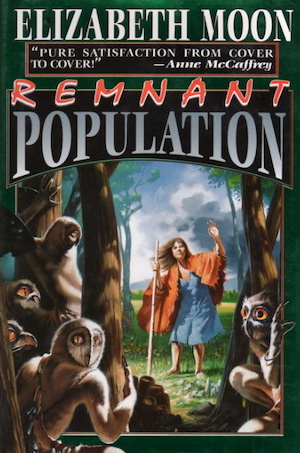
Sims Bancorp provided Ofelia and her family an amazing opportunity: enrich the company while laboring as peons on Colony 3245.12. The investment didn’t pan out. Sims Bancorp decides to relocate the entire population to some more promising world. The colonists are not consulted.
Ofelia, after having labored as a peon for long years, finally rebels. She evades relocation. She’s not at all sure that she can live on her own, but she plans to enjoy her solitude.
Except Ofelia is not nearly as alone as she thinks she is.
***
No doubt you have your own favourite recluses, hermits, and loners, protagonists who are (alas) not mentioned above. There are many such; they are, after all, frequently found in the ever popular post-apocalyptic subgenre. Feel free to mention the ones I missed in the comments, which are, as ever, below.
In the words of fanfiction author Musty181, prolific book reviewer and perennial Darwin Award nominee James Davis Nicoll “looks like a default mii with glasses.” His work has appeared in Publishers Weekly and Romantic Times as well as on his own websites, James Nicoll Reviews (where he is assisted by editor Karen Lofstrom and web person Adrienne L. Travis) and the 2021 and 2022 Aurora Award finalist Young People Read Old SFF (where he is assisted by web person Adrienne L. Travis). He is a four-time finalist for the Best Fan Writer Hugo Award, and is surprisingly flammable.
[1]The first thing that struck me was that the very idea of a “Canadian thriller” seemed utterly implausible.
[2]This book is the very Canadian thriller—I still cannot get used to that phrase—that inspired this essay.
[3]Why didn’t I talk about the poem and not the song based on it? Because I just don’t *get* poetry. For some reason I do get lyrics. Perhaps I would like listening to bards more than I like reading poetry.











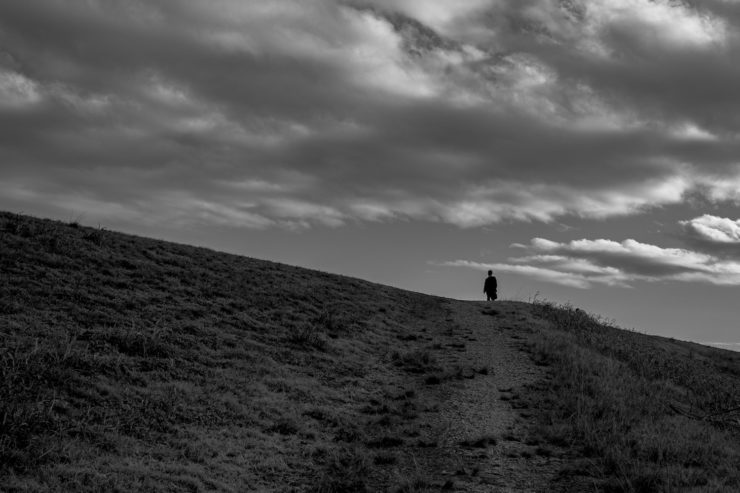
A Canadian thriller, I’m also having trouble with that phrase. Wikipedia says The Last Canadian was called Death Wind in the US. I guess marketing thought “Canadian thriller” wasn’t enticing enough.
The final section of Childhood’s End is about the last human being (as we understand it) witnessing the end of the planet…
Fitz from Robin Hobb’s Fool’s Errand, Book One of Tawny Man Trilogy. Fitz farms and hunts alone in a remote area for 15 or so years, except for his bonded wolf and his young orphaned foster son …. until the Farseers call him back into service in the capitol.
Re: Footnote 3: Why didn’t I talk about the poem and not the song based on it? Because I just don’t *get* poetry. For some reason I do get lyrics. Perhaps I would like listening to bards more than I like reading poetry.
I found this rather puzzling. The song lyrics are taken directly from the poem, though it turns out that some stanzas or half-stanzas have been left out of the song.
Being set to music does make a difference to the listener’s experience, but melody aside, if you’ve heard the song, you have, to a great extent, heard the poem.
I have heard it said that reciting poetry works better than reading it silently. My experience has been mixed.
Back in the ’80s i read an anthology called The Last Man on Earth,and the stories were all exactly that. It was a part of a series on anthologies edited by Asimov, Greenberg, and Waugh that all came out in the early ’80s.
There is perhaps a sub-category of recluses, those who are loners until the kid arrives and they become foster parents. Sybel in The Forgotten Beasts of Eld, pre-foster baby. Tenar at the beginning of Tehanu. I know I’ve seen this in other SFF, with male as well as female characters, though I can’t come up with many other names/titles at the moment. Also a common character trope in non-genre literature: Silas Marner, Goodnight Mister Tom, News of the World, etc.
One might say (spoiler alert!) that Remnant Population even fits into this pattern!
Remnant Population is a delightful comfort read for me, aging woman that I am. I find the cover art annoying, since they didn’t trust potential readers to spring for a book featuring a visibly old woman as the only human on the cover. Reminds me of the long history of dark-skinned protagonists being whitewashed in cover art–or not being depicted on the cover at all! Things have greatly improved on that front, with recent covers featuring gorgeous depictions of dark-skinned protagonists. Have we seen cover art yet centrally featuring an old woman who is not a witch? Not that I have anything against witches, I just can’t identify with them.
Hey, “The Brief History of the Dead” by Kevin Brockmeier! Half the story focuses on Laura Byrd, working in Antarctica, in the midst of a global pandemic, realizing she has to find supplies somewhere, so she starts out absolutely alone trying to find another base that might have food…
There has to be a whole sub-genre of lonely astronaut stories. “The Second Kind of Loneliness” by George R. R. Martin and “View from a Height” by Joan D. Vinge come to mind first, but there may be hundreds of these.
This makes me think of Marion Zimmer Bradley’s “The Wind People” (1958), although the protagonist is pregnant when she is left behind and is thus not strictly alone for long, and Larry Niven’s Protector (1973).
@6: There may also be a broader (and perhaps fuzzier) category of characters that begin as recluses until plot developments force them into the wider world. The first character I thought of when I saw the theme of this piece was Ansel, the introverted inventor in Dragonworld (1979) by Byron Preiss and Michael Reaves. When first introduced, he is happy to live alone in the wood, tinkering with his inventions and puttering in his garden, but the story has other ideas…
Just wanted to pop in to say I am very surprised and happy to find Loreena McKennitt’s song in one of these lists. Her songs are so beautiful (and occasionally even a bit unearthly, like something from the realm of the Fae or a time long lost), so glad one of them got a mention.
So we have a book with Canadian in the title, a book with a character named Canada, and a song performed by a Canadian singer. I’m sensing a theme within the theme here…
Enoch, the protagonist of Simak’s Way Station, is quite the recluse when the novel begins.
In Jay Lake’s “A Long Walk Home”, the main character survives a mysterious attack. He sets out, on foot, to find out what happened and if there are any other survivors on the planet. You can go a long way on foot if you have a lot of time.
In George R. Stewart’s Earth Abides, Ish is a bit of a loner. In the end, he becomes an elder of tribe, surrounded by children and grand-children. But in some ways he is more alone than ever, because he remembers civilization.
The Isis Trilogy by Monica Hughes are children’s books, or, with a bit of good will, YA, but the main character is a very interesting take on the recluse. The main character is the daughter of two spacefarers who are on an exploratory mission to prepare a small planet for colonization, but they die when she’s very young. She grows up isolated, raised by her parents’ robot, longing for the new colonists to arrive. When they do, she quickly realizes the downsides of having to be acceptable to human society.
@6: I should check out Remnant Population, then! Though I’m younger, I still love books with older female protagonists. They give me something to look forward to!
I’ve only read the first two Isis books but I found it rather odd that the characters avoid exposing the sins of one powerful bigot, even though deposing him would solve a lot of the problems.
“Nobody Bothers Gus” by Algis Budrys came to my mind.
Remnant Population is a fantastic book.
On the short story front, there’s Le Guin’s Solitude, about an entire society arranged around solitary introversion, narrated by the child of an anthropologist who had been studying them.
There’s a YA book, Empty World, by John Christopher, that I vividly remember, with a young man left alone after a plague sweeps the world. Also, unlike many books that depopulate the world with a fast moving plague, it addresses what happens to all the bodies.
Remnant Population is one of my favorite standalone sci fi novels. Not only is Ofelia a breath of fresh air as a heroine, but there’s some solid world building and linguistics happening, too. So glad to see it mentioned here, and to be reminded of McKennit’s “Lady of Shalott”, which I haven’t heard in 30 years.
I too love Remnant Population, not just an older female protagonist, but one who has had it with being told what she should do.
Mark Watney in The Martian is very alone for most of the story, even though he knows he’s being observed, he doesn’t always have a way to communicate. Project Hail Mary shows that Andy Weir has a thing for ‘lone spacefarer’ stories.
@JDN OP and EJF@@.-@
I was coming here to express my relief at hearing that there is someone else who finds that they don’t “get” poetry and yet does get lyrics.
You would think that poetry would “sing” for a singer” (that’s me) but I have the same problem. I “hate” poetry because I don’t get it. The first few times I read LOTR, I simply skipped all the poems!
It was only a few years ago that I realized that the lyrics I love are actually poetry set to music. I’ve thought a lot about it since then, and I think what I hate about reading poetry is the pace. I have my own reading “pace” which I cannot use with poetry. But if I’m singing the words, I have to sing them at a musical “pace” that applies its own emphasis and pauses. Also, if I love the melody, then that carries me with it and I learn to love the words.
@14: Thank you, I was looking for that!
@20: I found “Solitude” on the Internet Archive and stayed up too late reading it. I had never seen it before. What an astounding read. Le Guin has worked out the details of an apparently functional culture that (I presume) reacted to the ailments of civilization by attempting to remove the root cause, which they identified as communities. On one hand, the narrator’s evident happiness and cultivation of meditative peace speaks to something in my soul. On the other, what happens in this world to people who need company to anchor them–people who find that meditative peace in companionship? On the gripping hand, as presented, the culture can continue only as long as they are able to scavenge from the nearby cities. And yet, there is such peace. And yet…
@23: Yes, but he’s VERY good at that niche :). P:HM is as good as The Martian, which was really good (IMHO).
Also, P:HM is definitely one of the few examples I can point to where the audiobook has a clear comprehension advantage for me.
I adore “Remnant Population” – because I love that the protagonist is an older woman who is just DONE with this nonsense of moving to another planet and starting all over again. I’m 55 and can totally understand the “You know what, I’ll just hide in the woods, and live out the rest of my life here, do what I want, wear what I want, and eventually just die”
As a Canadian I always somewhat resented that the protagonist of The Last Canadian was a wealthy American who just happened to have access to a remote fishing camp way up in the north woods of Ontario. Frankly, while he may be technically Canadian, the TRUE last Canadian was the isolated native that unknowingly infects Gene and his family while canoeing across the lake. That individual finds them all either dead or dying (Gene recovers, but is feverish and unconscious), wonders why everyone he encounters is this way, and then moves on.
It’s either implied or outright stated that this was an isolated native hunter who regularly spent months out in the wilderness, was a carrier of the plague and had been searching for other living humans for weeks. He wanders out of the story so Gene can continue his adventures, but I’ve always wanted to know what happened to this guy. Did he eventually get to civilization? Did he eventually figure out why everyone in the world was dead? Did he realize he was a carrier? We never find out. I’d like to know more about the REAL last Canadian…
Check out the great film “Moon” directed by Bowie’s son Duncan Jones, starring Sam Rockwell. Also, Terry Pratchett’s Nation. Slowly other characters enter Mau’s small island nation. Let’s not forget “Sweet Tooth” comic and tv series that features a reclusive father and son.
Too bad the Last Canadian/Death Wind is out of print and hundreds to buy!
@24 – Pace in poetry. As someone who loves poetry, I would concur with you about pace. It takes a while to work some things out, and often reading it aloud helps with pace. IMO, poetry has to be read aloud. Unlike song, there are no notes with pitch and duration to help you – you have to rely on an understanding of meter which often takes study. But try reading “The Destruction of Sennacherib” by Byron out aloud:
“The Assyrian came down like the wolf on the fold,
And his cohorts were gleaming in purple and gold;
And the sheen of their spears was like stars on the sea,
When the blue wave rolls nightly on deep Galilee.” etc
Put the emphasis on every third beat. If it was song you could consider it as waltz time with two upbeats before you start the bar (technically anapestic tetramer). But say it at a reasonable pace and the rhythm drives you along – you can hear the horses galloping, the army marching to war – ta da dump, ta da dump, ta da dump dump dump from the William Tell overture. (Sennacherib was the Assyrian king, and he & his army ends up being destroyed by the angel of the Lord. Poor dead wolf.)
Traditional poets used every tool they could get their hands on: Rhyme and rhythm, alliteration and assonance, [Oh look at what I did there], onomatopoeia, and meter and stanza patterns. Poetry is ultimately an oral tradition, and these things help. Some of what passes as poetry these days seem to fail not because of a lack of inspiration, but a lack of knowledge of the tools and a refusal to edit first thoughts. Even a good writer needs to spend time polishing. I was recently inspired to write something when a young friend died. When inspiration comes, you stop everything and write it down. In this case, it was getting out of bed at midnight to put it on paper. In the first light of the next day, I saw I had something good. It would have stood as it was. But I knew better than to leave it. It underwent 4 significant revisions, and several minor ones where I just changes a single word, moved a line, or rearranged things. Unlike my usual process, I kept all the major revisions, mainly to show my wife how I work. The final poem is so much better, people who never knew my friend cried because of it. The tools I used gave the emotions I put on paper the power to wring the grief from them. Those who have seen the process see the benefits of polishing a work rather than just spattering words onto paper.
As for LOTR – I don’t think Tolkein was a good poet. He knew the tools and how they worked: Consider one of the first: The road goes ever on and on/Down from the door where it began. (Dactylic tetramer, with every second line rhyming. Tennyson uses it in “In Memorium”: And bats went round in fragrant skies/and wheel’d or lit the filmy shapes – accent on every second syllable. Knowing how the tools are used makes you a versifier, a writer of Hallmark greeting cards. Using those tools to move people makes you a poet, and there is little emotion in the poetry of LOTR – Legolas in the chapter “The Field of Comallen” sings of leaving the woods to sail on the gry ships” but I feel no regret nor joy in the song. So don’t be bothered by the fact that you just flipped over them, they added little to the story other than showing that song and poetry existed in the world.
The Slow Regard of Silent Things by Patrick Rothfuss fit in this category.
@24: I got around the Tolkien poems (and many other poems embedded in literary prose works) by setting them to music. A number of them I have never “heard” spoken in my head as I read, only sung.
‘Knock’ by Fredric Brown.
“The last man on earth sat at a desk. There was a knock at the door.”
” Verses are children of the lyre / They should be sung, not said.”
I loved the performance of The Lady of Shalott. But it was hardly Lancelot’s fault – he was just passing !
“Here I stay” by Elizabeth Coatsworth. An American village moves west except for one young woman who continues to farm alone..
@@@@@ 31, peterputer:
Even a good writer needs to spend time polishing. I was recently inspired to write something when a young friend died. When inspiration comes, you stop everything and write it down. In this case, it was getting out of bed at midnight to put it on paper. In the first light of the next day, I saw I had something good. It would have stood as it was. But I knew better than to leave it. It underwent 4 significant revisions, and several minor ones where I just changes a single word, moved a line, or rearranged things. Unlike my usual process, I kept all the major revisions, mainly to show my wife how I work. The final poem is so much better, people who never knew my friend cried because of it. The tools I used gave the emotions I put on paper the power to wring the grief from them. Those who have seen the process see the benefits of polishing a work rather than just spattering words onto paper.
When I polish a first draft—or a second—or a third—I copy the original and paste it. Start the polishing from there. The reason I work that way is in case I make a horrible mistake. The new draft is worse than the first. That doesn’t happen often, but it does happen. When it does, I can return to a previous draft and start anew. Copy and paste for each new rewrite is cheap insurance.
I was coming back this morning just to thank those who kept going back to Remnant Population. Because it came up again and again in the comments, I decided to read it. It’s the first time in a long time that I didn’t want to put a book down!
Now that I’m here, I’ll respond to a couple of those who referred to my post:
peterputer @41 said: Rhyme and rhythm, alliteration and assonance, [Oh look at what I did there] Oh my, aren’t you clever! No…really! I happen to be an editor by profession, and I find myself distracted by unintentional use of (esp) alliteration, where strict prose belongs. I also appreciate your pointers for finding the right pace and rhythm for reading poetry.
Tekalyn @33 mentioned setting Tolkien’s poems to music. I did the same! I sat down at the family piano, and just played around until I had something that worked. Several of my melodies I remembered for years afterward, although I’ve lost them now and they were never written out. I was so excited when I heard about the Swann settings, which I then actually found quite disappointing. I was even more disappointed to read how much Tolkien liked them. Oh, well.
Amy DeLong @32 reminded us that Slow Regard of Silent Things fits into the topic. Of course! How could I forget? I am one of those who loved it (as opposed to those the author predicted would be put off by the lack of “plot”).
Poul Anderson’s 1954 story “The Chapter Ends” (available over on Project Gutenberg) gives us an Earth being evacuated so that an alien civilization can take up residence. One old man refuses to leave, and becomes the last Earthman. As I recall, it doesn’t end well for him.
The Possibility of an Island , a novel by Michel Houellebecq, that I like to classify as existencial sci-fi; in one of the sub-plots narrates the solitary future of the human species. Perhaps it resembles the above mentioned Le Guin’s ‘Solitude’.
@39: I should add to what I said about “Solitude” that there is peace for women and children. As soon as it’s clear that a boy has entered puberty, he has to leave home forever. He is expected to live with other boys, who are expected to fight one another all the time–fight violently, with weapons. Meanwhile, the local men keep an eye on them. Being charismatic enough to get people to change their actions according to what you say is seen as a return to the bad old days. If adults do it, they either enter lives of total isolation, as a matter of conscience, or they are driven out to lives of total isolation. If boys do it, they are killed by the local men. So any boy who can get the others to work together instead of fighting is killed. If the boys form a gang that attacks adults, all of them are killed. Eventually the boys who don’t get killed by fighting one another or by men are allowed to leave. Women build their solitary homes within sight of the hearth smoke of at least one neighbor, but men appear to live even further apart than that. They meet other adults in passing while foraging, and sometimes women visit them to have sex–that’s it. They don’t even get to keep their own names, being known for the rest of their lives by loconyms conferred by others. Somebody whose mother named him Tik might be known for the rest of his life as “Upriver Rock Man.” When a woman begins to die, it is culturally acceptable for neighbors to bring her things she can’t get for herself anymore, but it appears that men always die alone. (It may be marginally less bleak than this: the narrative includes the viewpoints of children, women, and adolescent boys, but not men.)
This all appears to be an attempt to curtail patriarchy and a second world-destroying civilization, which are viewed by that culture as the same thing. It’s regarded as necessary and any deviation from the pattern is a transgression against the natural order–but it’s also not considered strange for a woman to drown her newborn son, to spare herself the grief.